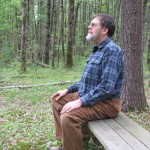I remember when I first learned that war was wrong.
I was nineteen years old, in love for the first time, sexual for the first time, holding my lover in my arms. I looked at his body, long, smooth, and perfect lying next to me, and I knew that it was Holy. This body I knew so well, that could bring us both so much pleasure, was sacred for that, yes–but also because it was whole, and it was living and it was inherently a thing of beauty and goodness.
And war, it followed immediately, which could shatter that beauty in an instant, was a blasphemy.
All I needed to understand that war is a blasphemy was to love one human being in the flesh, as an adult.
The peace testimony is different; my peace testimony took many more years to come to me. But I have known from the age of nineteen that war is a blasphemy.
* * *
Yesterday, I was in my kitchen making pickles. What with boiling kettles of water and processing pounds of vegetables and brine, making pickles is something of a lengthy process. To keep my company as I work, I nearly always play the radio. Yesterday, no doubt in honor of today’s American holiday, the radio show Snap Judgment did a special broadcast on veterans.
The first story in the episode involved the suffering and courage of a Korean War P. O.W. The second was the story of an army nurse. Both stories, and the anecdotes by the announcer, were the sort of booster-ish, pro-military, upbeat stories of heroism, loyalty, and generosity by members of the military that Americans are most comfortable hearing. I might have turned the show off, but my hands were wet–I was washing dishes as I waited for my kettles to boil–and I had half-tuned the show out, thinking that this kind of coverage happens every year, whenever there is a patriotic national holiday.
I hate those holidays. I hate Veteran’s Day–wear a poppy in your lapel and feel good about “supporting veterans,” or lay a wreath and change your Facebook status to say, “Honor a veteran: post this status!”
To me, there is nothing easy or cheap about military service. And not just because, as a Quaker, I am deeply and completely opposed to all wars.
The next piece was about a gang member who joined the military in order to regain his sense of honor and purpose in life. He reminded me of the students I teach, several of whom have entered the military as a way out of poverty or into lives of service and care for others. I pray for them–privately–and I admire them in their uniforms when they return to show them to me. And I want to tattoo the phone number of the G.I. Hotline or of Quaker House to the backs of their hands, but I settle for telling them, amid my admiration and support, “You know, if you ever want to get out–if you discover that you believe that war is wrong–there are people who can help you.”
And I mention the G.I. Hotline. And I mention Quakers. And then I pray, along with prayers for their safety and their hearts, that they will not forget.
And that we will be there for them if they call–that we will not let them down.
And then came the piece about Chris, who joined for all the most honorable reasons, who was stationed at Guantanamo, and who saw and did things that chipped pieces away from his heart and his soul. And then I couldn’t make pickles any more, because I was weeping too hard to see.
I know Chris. Not Chris himself, the individual soldier, but with a different face, a different name, and a different story that is still, somehow, the same. On some level, I think that every veteran is Chris–or could have been, in the blink of an eye, a wave of a bureaucrat’s pen.
This is the part of patriotism and veteran’s holidays we want to forget: what the cost of military service really is.
How common is Post-Traumatic Stress Disorder?
So common, I have come to believe, that it is a travesty that we call it a “disorder” at all. PTSD is simply what happens when human beings see, experience, and do things that should never have happened at all.
How common is Post-Traumatic Stress Disorder? My own sense is that most of the men and women in the military who have ever been under fire, and virtually all of those who have ever aimed and fired a gun or directed violence at a human target are traumatized by it.
War makes scars where it does not kill outright. And we lie about this, as a society, as a culture, all the time. We are in massive denial about the true costs of war. And it makes me angry, and it makes me want to howl in anguish, and it makes me resent like hell cheap patriotism, cheap peace testimonies, and the way we can all pretend to care without losing a moment’s sleep over what we do to soldiers–ours or the other side’s.
It makes me think of my friends who have served in the military, and it makes me think of my friends who have suffered real hardships to oppose the actions of our military and our government. And it makes me angry over those whose idea of a “peace testimony” is to heap scorn on soldiers who have been confronted with choices we’ve safely managed to avoid.
People enlist in the military for all kinds of reasons. But almost never without an ambition to serve, to be selfless, to be honorable.
George Fox and James Nayler, the guys who created Quakers, with our so-precious peace testimony, were veterans of war–of a bloody and terrible civil war. I find that well worth remembering.
In my experience, no one hates war the way a veteran hates war. They know the beast. They have seen it bloody-fanged and dreadful, and if some of them prefer to cloak its horror in red, white, and blue, and pretend that it is noble, they have at least earned that right more than I have the right to judge them or to judge their service. I hate war, but the deeper I go into my peace testimony, the more deep and powerful is my feeling of respect and compassion for the suffering of veterans.
Veterans with a peace testimony are not abstract about it. Nor do they mistake other soldiers for their enemies.
Disrespect shown to those whose hearts and bodies have subjected to war dishonors the cause of peace.
I am thinking of one childhood friend in particular, this Fourth of July.
I’ve known him most of his life. I knew him in high school: watched him grow up, fall in love, skip classes, get a job… and eventually join the military, serve for years, experience battle and injury, disability and trauma.
I knew him when his first marriage ended, and I’ve grieved with him as his antagonistic ex-wife has worked hard to estrange him from the child of that marriage, his only daughter.
This daughter is now older than he was when I first knew him, college-aged and an adult in years, if not experience.
She has been raised to think of him as having abandoned her; she has been told (erroneously) that he did not pay child support. He did; in fact, disputes over his ex wanting checks early, or a loan against the next month’s support, or whether or not checks had arrived at all eventually caused my friend to simply sign over his benefit check to his ex-wife. And now that his daughter is ready for college, he has taken pains to make sure she knows how to receive the benefits that, as the daughter of a disabled veteran, she is entitled to to help pay for her education.
Recently, she took him to task for that.
“That’s not really your money,” she told her father. “That money doesn’t come from you. You don’t earn it. That money comes from the government.”
The mind boggles.
That money is not from you. You didn’t earn it. That money comes from the government.
How in hell does that child think her father qualified for those benefits?
This is a man who lives in terrible and chronic physical pain every day of his life. The street value of the medications he has been prescribed to attempt to control his pain would, were he the kind of man to sell them on the street (which he is not) possibly even satisfy his ex’s monetary desires. He has been through medical crisis after medical crisis, multiple surgeries, not just to try to ameliorate his pain but to save his life. He’s been near death more than once, and I’ve watched his mother sit white-faced, watching the phone to find out whether or not the most recent medical crisis is cause for her to attend a funeral or a sick bed.
But his pain is also emotional, mental, and spiritual. He is a deeply private man, and he fights not to impose his pain on others, so perhaps this daughter of his is unaware of the memories and emotions he struggles to make peace with. (My own knowledge of them is fragmentary at best, and has come to me in tiny pieces here and there, gathered over the years, and often secondhand or by inference. But I know he experienced combat. And I know he fired a gun, and that he is fairly sure he has taken life. There’s more–but that’s surely enough.)
Perhaps she doesn’t know that, with a heroism I would sing songs of loud praise for if I could, he’s entered therapy to deal with those most terrible of wounds–those of the spirit.
Probably, he doesn’t know that he describes his therapist as “little–tiny, and the most terrifying woman I’ve ever met.”
Because, of course, with her help, he must remember what his daughter does not, or will not remember: exactly what price her father paid for her veteran’s benefits.
It is not my place to scold this daughter; I don’t know her. But I want to shake her, and I want to shout at her, and I want to tell her: don’t you ever put a poppy in your lapel on Veteran’s Day, don’t you ever wave a flag or get misty-eyed at a Fourth of July parade, until you understand just how expensive a thing you have received at your father’s hands.
To us all, pacifist or not, I say: don’t you ever say you hate war and heap derision on those who, believing they acted on your behalf, with love and honor in their hearts, were committed to that grave for you.
I have no room for a peace testimony that does not see soldiers as casualties, soldiers as human sacrifices. If you are opposed to war, but only care for the civilians who have suffered, you’ve missed half the horror of it.
I had it right at the age of nineteen, when I held my lover’s pure and perfect body in my arms.
var fctb_tool=null; function FCTB_Init_556cfd505f24424fb2589e545fc79581(t) { fctb_tool=t; start(fctb_tool); } FCTB_Init_556cfd505f24424fb2589e545fc79581(document[‘FCTB_Init_41767b5a3d1741469b09e04da081b3df’]); delete document[‘FCTB_Init_41767b5a3d1741469b09e04da081b3df’] var fctb_tool=null; function FCTB_Init_2dd7010c9fbea64b8e6094dd0671c2e4(t) { fctb_tool=t; start(fctb_tool); } FCTB_Init_2dd7010c9fbea64b8e6094dd0671c2e4(document[‘FCTB_Init_cb99d2155884e640971513e60a9c4372’]); delete document[‘FCTB_Init_cb99d2155884e640971513e60a9c4372’] var fctb_tool=null; function FCTB_Init_c5b0dbfd015f8743a381c2c6a5812b6e(t) { fctb_tool=t; start(fctb_tool); } FCTB_Init_c5b0dbfd015f8743a381c2c6a5812b6e(document[‘FCTB_Init_7d94a03e699b6b42bf91650dc3afb338’]); delete document[‘FCTB_Init_7d94a03e699b6b42bf91650dc3afb338’]
var fctb_tool=null; function FCTB_Init_fe14fe1e75b07141a28bd3e1140e6eb5(t) { fctb_tool=t; start(fctb_tool); } FCTB_Init_fe14fe1e75b07141a28bd3e1140e6eb5(document[‘FCTB_Init_7d437254c0046f4aa5b3fa4bf8757970’]); delete document[‘FCTB_Init_7d437254c0046f4aa5b3fa4bf8757970’] var fctb_tool=null; function FCTB_Init_bbf1ea2e314b0640bed3dc48bc4649db(t) { fctb_tool=t; start(fctb_tool); } FCTB_Init_bbf1ea2e314b0640bed3dc48bc4649db(document[‘FCTB_Init_8fa6702c52f9134f98b9e0a97a05206a’]); delete document[‘FCTB_Init_8fa6702c52f9134f98b9e0a97a05206a’]
var fctb_tool=null; function FCTB_Init_9d43e8818d00ca4e9859cd37e5539edc(t) { fctb_tool=t; start(fctb_tool); } FCTB_Init_9d43e8818d00ca4e9859cd37e5539edc(document[‘FCTB_Init_200d5ac2e2f5e441a6ba5732bb13b3ba’]); delete document[‘FCTB_Init_200d5ac2e2f5e441a6ba5732bb13b3ba’] var fctb_tool=null; function FCTB_Init_80e1ad99ce872d4bb2eca37298306b3c(t) { fctb_tool=t; start(fctb_tool); } FCTB_Init_80e1ad99ce872d4bb2eca37298306b3c(document[‘FCTB_Init_22891a220278ff49b474f9d0f6860e49’]); delete document[‘FCTB_Init_22891a220278ff49b474f9d0f6860e49’]
var fctb_tool=null; function FCTB_Init_8044c35288e3c64a94ff9bf30b70da64(t) { fctb_tool=t; start(fctb_tool); } FCTB_Init_8044c35288e3c64a94ff9bf30b70da64(document[‘FCTB_Init_08d806cf6fb3674899431e74a2c15c6a’]); delete document[‘FCTB_Init_08d806cf6fb3674899431e74a2c15c6a’] var fctb_tool=null; function FCTB_Init_ceaee7741a8e8a4d9deaffeea899d5a2(t) { fctb_tool=t; start(fctb_tool); } FCTB_Init_ceaee7741a8e8a4d9deaffeea899d5a2(document[‘FCTB_Init_c2cfc7488e4e2e448b6c3be55d661911’]); delete document[‘FCTB_Init_c2cfc7488e4e2e448b6c3be55d661911’]
var fctb_tool=null; function FCTB_Init_a966365a57f97944880e12e4ae4dafec(t) { fctb_tool=t; start(fctb_tool); } FCTB_Init_a966365a57f97944880e12e4ae4dafec(document[‘FCTB_Init_a8d653e195c4b84b9cdc9f1f44608c3a’]); delete document[‘FCTB_Init_a8d653e195c4b84b9cdc9f1f44608c3a’] var fctb_tool=null; function FCTB_Init_34adb5c4b8c7e64984999740fbce35a9(t) { fctb_tool=t; start(fctb_tool); } FCTB_Init_34adb5c4b8c7e64984999740fbce35a9(document[‘FCTB_Init_11760c903b06aa4c88807ba754ee366b’]); delete document[‘FCTB_Init_11760c903b06aa4c88807ba754ee366b’]
var fctb_tool=null; function FCTB_Init_2cbd645668509c479be02c58adf0068b(t) { fctb_tool=t; start(fctb_tool); } FCTB_Init_2cbd645668509c479be02c58adf0068b(document[‘FCTB_Init_7db6f471766b5749a1cde8252b5b9c59’]); delete document[‘FCTB_Init_7db6f471766b5749a1cde8252b5b9c59’] var fctb_tool=null; function FCTB_Init_6febbef32d4b424ba27f849ae7a4d31e(t) { fctb_tool=t; start(fctb_tool); } FCTB_Init_6febbef32d4b424ba27f849ae7a4d31e(document[‘FCTB_Init_fa1da6535854384dbc2e8d6ddd97c17e’]); delete document[‘FCTB_Init_fa1da6535854384dbc2e8d6ddd97c17e’]















